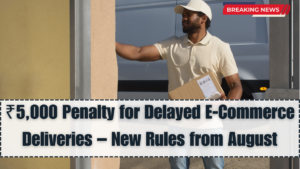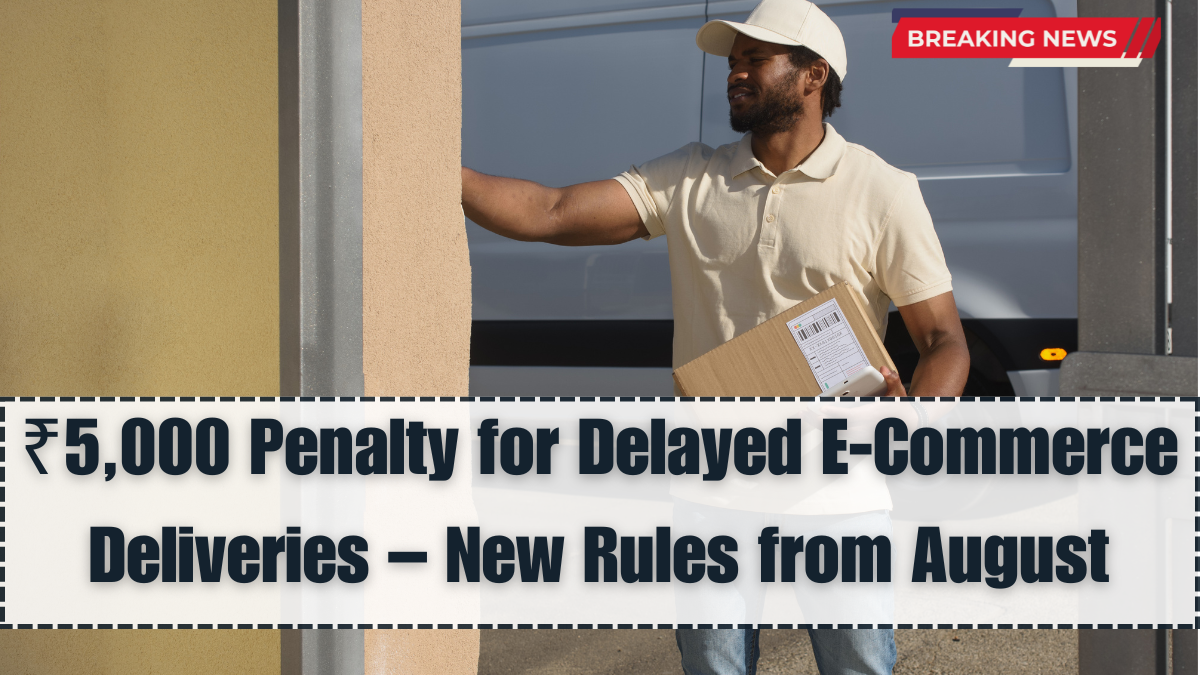Starting August 2025, the Indian government has enforced the E-Commerce Delivery Penalty Rules, introducing a standard ₹5,000 penalty for delayed deliveries by e-commerce and courier companies. This regulation falls under the Consumer Protection Act and is already in effect across all major platforms and courier partners.
The move aims to make online deliveries more reliable, accountable, and customer-centric. The E-Commerce Delivery Penalty Rules apply to both private and public logistics providers operating in India, bringing structure to a previously unregulated delivery timeline system.

Key Highlights of the Penalty Rules for E-Commerce Deliveries
The E-Commerce Delivery Penalty Rules 2025 bring uniform guidelines across the industry to ensure timely and transparent service:
-
₹5,000 penalty for each delayed delivery without a valid reason
-
Mandatory timeline disclosure on checkout pages
-
Refund of delivery charges in case of late arrival
-
Auto-penalty credit system initiated by the e-commerce platform
-
Consumer right to file complaints via national redressal portal
-
Stricter SLAs for courier firms under the updated logistics policy
These rules are aimed at boosting confidence among online shoppers and regulating courier practices across India.
When Does a Delivery Qualify as ‘Delayed’?
As per the courier rules, a delivery is considered delayed when:
| Condition | Rule Applied |
|---|---|
| Delivery made after expected date | ₹5,000 penalty initiated |
| Customer not informed of delay | Platform must issue full refund + penalty |
| Delay due to logistics error | Courier company penalized under SLA |
| Delay due to force majeure | No penalty (natural disasters, strikes) |
The new ecommerce delivery regulations now make it mandatory to record, monitor, and compensate for every late order.
Which Companies Are Covered Under the New Rules?
The E-Commerce Delivery Penalty Rules apply to:
-
Online marketplaces like Amazon, Flipkart, Meesho, Ajio
-
Food and grocery delivery platforms like Zomato, Swiggy, Blinkit
-
Courier aggregators such as Shiprocket, Delhivery, Ecom Express
-
Direct-to-consumer brand websites using third-party shipping
-
All B2B e-commerce logistics providers
Each company must now align with the national delivery regulation protocol and report delays monthly.
What It Means for Sellers and Customers
With the E-Commerce Delivery Penalty Rules, both sellers and customers stand to benefit:
-
Faster deliveries due to strict SLA enforcement
-
Compensation for delayed or missed deliveries
-
Improved transparency in courier tracking systems
-
Pressure on sellers to fulfill orders within committed time
-
Stronger legal recourse for consumers
This is a major reform in the Indian ecommerce industry under the broader logistics policy.
FAQs
What are the E-Commerce Delivery Penalty Rules?
E-Commerce Delivery Penalty Rules are government-enforced regulations that penalize late deliveries with ₹5,000 per violation starting August 2025.
Which platforms are affected?
Major e-commerce platforms, courier services, and D2C sellers using third-party logistics are covered under the courier rules.
How is the penalty enforced?
The penalty is auto-applied through the platform’s tracking system and must be reflected in the customer’s account within 48 hours.
Can customers file a complaint?
Yes, customers can raise a complaint through the National Consumer Helpline or grievance portal if compensation is not processed.
Are delays due to weather or strikes penalized?
No, delays due to uncontrollable situations (force majeure) are exempt under the delivery regulation rules.
Click here to know more.
Aanchal is a passionate writer with a keen interest in storytelling, content creation, and creative expression. She enjoys exploring diverse topics and crafting engaging narratives that captivate readers.
